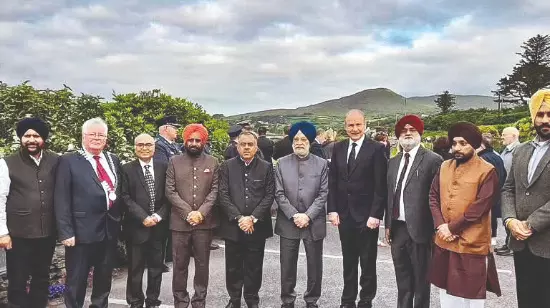India, Ireland & Canada commemorate 40th anniv of Air India flight 182 bombing

New Delhi: In a historic move, India, Ireland, and Canada jointly marked the 40th anniversary of the bombing of Air India flight 182, also known as Kanishka, with solemn commemorative events held in Cork, Ireland, and New Delhi. The tragedy, which occurred on June 23, 1985, claimed the lives of all 329 people on board and remains the deadliest aviation-related act of terrorism prior to the 9/11 attacks in the United States.
In Cork, a memorial service took place at the monument overlooking the Atlantic Ocean, close to where the aircraft’s wreckage was discovered. Union Minister Hardeep Singh Puri led the Indian delegation and joined Irish Prime Minister Micheál Martin, Canada’s Public Safety Minister Gary Anandasangaree and the ambassadors of the three nations in honouring the victims.
“This was an unspeakable act of terrorism,” said Puri during his address at the ceremony. He urged countries to strengthen international cooperation in countering radicalism and violence. “We must ensure that what happened on June 23, 1985, is never repeated — not in India, not in Canada, not anywhere else in the world.”
Puri called for deeper collaboration with Canada in tackling extremism, noting, “When individuals who glorify violence are allowed space, they pose a danger not just to specific communities but to the very fabric of democratic societies.” He said that India’s security agencies are ready to work closely with global partners to address these ongoing threats.
Canadian Minister Anandasangaree echoed the sentiment, stating that remembrance must also lead to collective vigilance. “We come together today not just to mourn but to reaffirm our shared responsibility in ensuring the safety of our citizens against such acts of terror.”
Irish Taoiseach Micheál Martin highlighted the significance of solidarity across borders, remarking, “While this is a moment of shared grief, it also stands as a testament to the enduring connections between our nations.”
The event began with a minute’s silence observed at 8:13 am — the exact time the bomb detonated mid-air over the Atlantic. Wreaths were laid by family members of the victims, with several recalling the moment their lives were forever changed. The names of all those who died are engraved on the Cork memorial, which has become a site of annual reflection.
A parallel event was held in New Delhi at Canada House, attended by diplomats and relatives of the victims. The closed-door gathering included a ceremonial minute of silence and the signing of a remembrance book. A tree was also planted in memory of the deceased.
Speaking at the event, Canada’s chargé d’affaires Jennifer Daubeny said, “In Canada, June 23 is observed as the National Day of Remembrance for Victims of Terrorism. This day reminds us of the urgent need to work together to counter the threat of terrorism globally.”
Irish Ambassador to India Kevin Kelly acknowledged the enduring grief of the victims’ families and the local Irish community’s support in the aftermath. “The people of Ahakista opened their homes and hearts to the bereaved. Their compassion formed a bond that continues to bring our nations together.”
On the day of the attack in 1985, a bomb planted by Khalistani terrorists brought down Air India flight 182 — a Boeing 747 en route from Montreal to London — around 200 kilometres off the coast of Ireland. Of the 329 people killed, 268 were Canadian nationals, many of Indian origin, along with passengers from India and the United Kingdom.
Investigations later revealed that the explosives were loaded in Vancouver in suitcases intended for two separate flights. A second bomb detonated at Tokyo’s Narita Airport, killing two baggage handlers as it was being transferred to another Air India flight.
Efforts to bring those responsible to justice were hindered by a protracted investigation and legal proceedings in Canada. Despite arrests, the case led to only one conviction — Inderjit Singh Reyat — while others walked free due to lack of evidence.
The anniversary also comes amid attempts to restore strained diplomatic relations between India and Canada. The two countries had downgraded ties following allegations made in 2023 by then-Prime Minister Justin Trudeau regarding India’s alleged involvement in the killing of a Canadian citizen linked to the Khalistan movement. India rejected the claims as baseless. A recent meeting between Prime Minister Narendra Modi and Canadian leader Mark Carney at the G7 Summit signalled a step toward normalisation.
The events in Cork and New Delhi mark a rare moment of trilateral unity in acknowledging a tragedy that had, for decades, drawn differing political responses. Participants across all three nations called for lasting cooperation in confronting terrorism and safeguarding communities against hate-driven violence.



